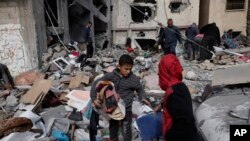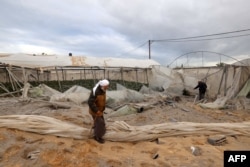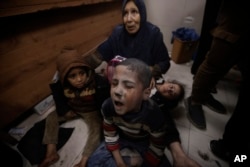United Nations officials say Palestinians in Gaza are in a state of desperation after nearly three months of being militarily battered and left without sufficient supplies of food, water and medicine.
"The level of desperation of people is palpable and breathable. It is a situation of desperation that you can feel it, that you can really touch it with your hands," said Andrea De Domenico, head of the Office for the Coordination of Humanitarian Affairs (OCHA) in the Occupied Palestinian Territory.
Speaking from Jerusalem to journalists in Geneva on Friday, De Domenico said hundreds of thousands of Palestinians are crammed into ever smaller spaces and forced to set up makeshift shelters in overcrowded, unsanitary conditions, with no toilets or basic amenities.
"There is no public service. There is a lack of shelter, a lack of water, a lack of food, and a lack of health. … This high pressure is turning more and more into increasing tension vis-à-vis the U.N. and vis-à-vis the humanitarian community who are unable to address their basic needs.
"[The desperate Palestinians in Gaza] are not aggressive so far, but this tension will increase if we do not scale up our operations," he said, noting that when supply trucks cross the border into Gaza, Palestinians go to the trucks, thank the U.N. for coming and then "take whatever they can for them and their families to survive."
The OCHA representative said his team has told him that "the faces of the people who are coming to the trucks … are clearly the faces of people who are starving."
This Sunday will mark 100 days since Hamas and other Palestinian armed groups launched their attack on Israel, in which 1,200 people, mostly Israeli, were killed and around 240 hostages taken, among them children.
The brutal assault unleashed a ferocious response by Israel's military, reportedly resulting in the deaths of more than 23,000 Palestinians, about two-thirds of them women and children, and the massive destruction of civilian infrastructure, including homes, hospitals, schools and places of worship.
"As U.N. High Commissioner for Human Rights Volker Turk has repeatedly urged, there must be an immediate cease-fire on human rights and humanitarian grounds," said Turk's spokeswoman, Liz Throssell.
It is more urgent than ever that there be "a cease-fire to end the appalling suffering and loss of life, and to allow the prompt and effective delivery of humanitarian aid to a population facing shocking levels of hunger and disease," she said, adding that Israeli Defence Forces "must take immediate measures to protect civilians fully in line with Israel's obligation under international law."
The U.N. Children's Fund (UNICEF) echoed this plea for an immediate and long-lasting cease-fire, stressing that this "is the only way to end the killing and injuring of children and their families and enable the urgent delivery of desperately needed aid."
Speaking from Jerusalem, Lucia Elmi, UNICEF's special representative in the Palestinian territories, warned that conditions in the Gaza strip — especially for children — continue to deteriorate rapidly.
"Children in Gaza are running out of time, while most of the lifesaving humanitarian aid they desperately need remains stranded between insufficient access corridors and protracted layers of inspections," she said.
"Thousands of children have already died and thousands more will quickly follow" if the problems of conflict, disease and malnutrition are not quickly addressed, she added.
By way of illustration, she noted that in the past two weeks, the number of diarrhea cases among children under five has almost doubled from 40,000 to 70,000.
The conflict, along with the increased burden of disease and the increasing severity of malnutrition, is putting at risk over 135,000 children of severe acute malnutrition.
"The combination of these three problems plus the lack of water and sanitation in terms of malnutrition is one of the key concerns at the moment," she said.






